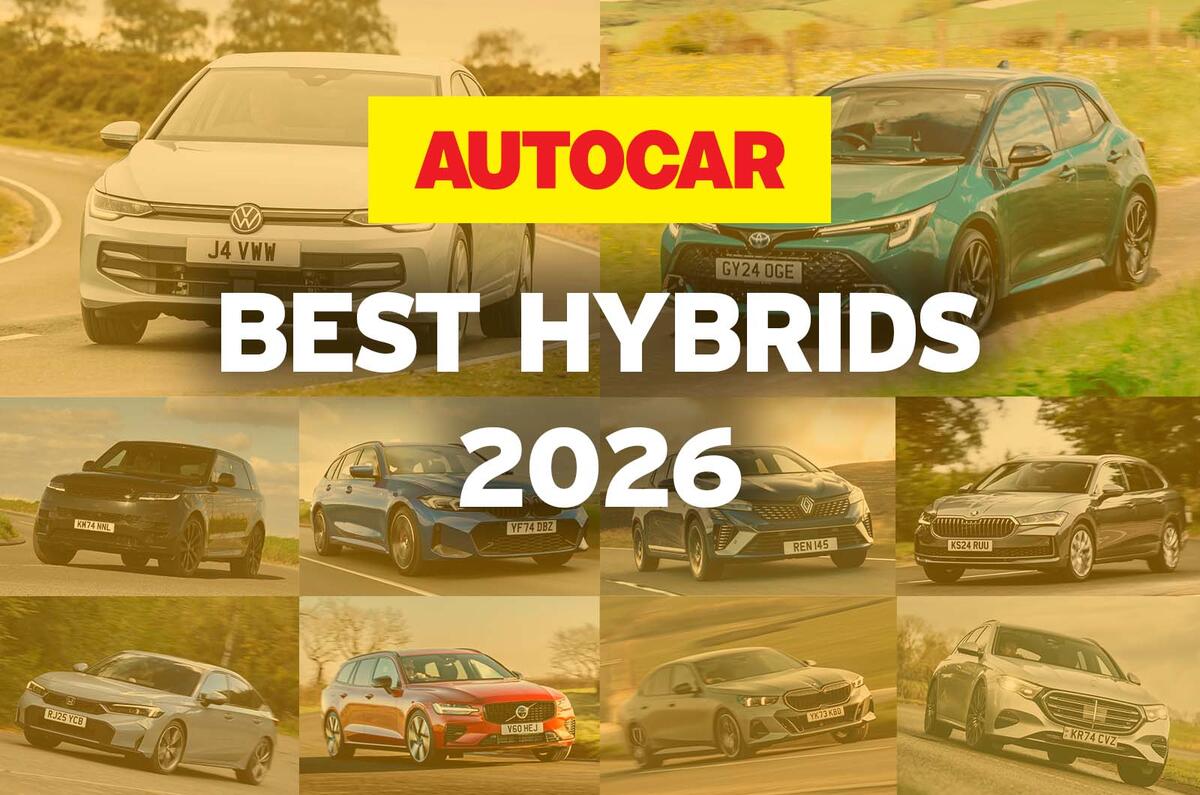In just four years time, new petrol and diesel cars will no longer be sold in the UK, but there’s a lifeline for those who aren’t yet ready to go fully electric: new hybrid cars will still be sold until 2035.
Whether 'self-charging' or plug-in (PHEV), hybrids are already the go-to choice for those who want to combine green emission ratings with low running costs and the ability to refuel in minutes at a pump.
For private buyers, they offer a safety net: you can cruise around silently in urban areas while running solely on EV power, then switch to a combustion engine for longer journeys along the motorway.
For company car drivers, PHEVs bring much lower benefit-in-kind (BIK) tax rates, helping drive down running costs further.
The technology surrounding hybrids and PHEVs has matured significantly in just the last few years, with a handful of new PHEVs now promising an electric-only range of more than 80 miles.
Hybrids like the Honda Civic e:HEV have also risen in popularity, appealing to those who don’t have a driveway for charging, but still want 60mpg-plus.
We think the Volkswagen Golf eHybrid is the best hybrid money can buy today. It’s a practical family hatchback that’s good to drive, easy to use and comes with a truly commendable all-electric range.
But which other hybrids make our top 10? Read on to find out.
Best for: All-around ability
The latest Golf is a real return to form for what was the archetypal family hatchback. It comes in two PHEV forms, the 201bhp eHybrid and the 268bhp GTE, the former of which is our pick of the range - and we think it's the best hybrid you can buy today.
Named the Best Hybrid at the 2025 Autocar Awards, the Golf eHybrid offers a simply enormous 88 miles of electric range in a package that drives well and has slick steering, assured handling and a reasonably supple ride.
And while it’s not a car that will have you grabbing the keys for an illicit B-road blast, its ability to effortlessly tackle any task is endearing, as is a chameleon-like quality to fit into any surroundings.
Downsides include the touchscreen infotainment is a little frustrating to use and hybrid variants get marginally less boot space, reduced to 273 litres.
Read our Volkswagen Golf eHybrid review












Join the debate
Add your comment
Color Mania is described in a straightforward and engaging way, making it easy for readers to grasp the gameplay and rewards.
อยากซื้อรองเท้าไม่พลาด? รวม adidas และ Nike รุ่นยอดนิยม
รองเท้า adidas คู่ใจสายสไตล์
ถ้าพูดถึงสนีกเกอร์ที่ทั้งใส่สบายและแมตช์ง่าย รองเท้า adidas คือคำตอบที่ไม่ทำให้ผิดหวัง ดีไซน์เรียบแต่มีเอกลักษณ์ ใส่ได้ตั้งแต่วันทำงานไปจนถึงวันเที่ยว จุดเด่นคือเทคโนโลยีพื้นรองเท้าที่ช่วยซับแรงกระแทก ทำให้เดินทั้งวันก็ยังสบาย ใครกำลังมองหาคู่ใหม่ บอกเลยว่าต้องลอง!
อาดิดาส แบรนด์ระดับโลกที่คุ้มค่าทุกบาท
ชื่อของ อาดิดาส ไม่ได้ดังแค่เรื่องแฟชั่น แต่ยังขึ้นชื่อเรื่องคุณภาพและความทนทาน เลือกซื้อครั้งเดียว ใช้ได้นานหลายฤดูกาล เหมาะกับคนที่อยากลงทุนกับรองเท้าดี ๆ สักคู่ แถมยังมีหลายไลน์ให้เลือก ทั้งสายสปอร์ตและสายสตรีท
sport shop แหล่งรวมของแท้ที่ช้อปแล้วอุ่นใจ
การเลือกซื้อจาก sport shop ที่เชื่อถือได้ ช่วยให้มั่นใจว่าได้ของแท้และไซซ์มาตรฐาน หลายร้านยังมีโปรโมชันและบริการหลังการขาย ทำให้การตัดสินใจง่ายขึ้น เหมาะมากสำหรับคนที่อยากได้รองเท้าคุณภาพในราคาคุ้มค่า
nike kobe 8 ตำนานที่สายบาสต้องมี
สำหรับแฟนบาสเกตบอล nike kobe 8 คือรองเท้าที่ผสานความคล่องตัวกับดีไซน์เท่ ใส่เล่นกีฬาได้จริงและยังใส่เดินได้ในชีวิตประจำวัน ถ้าคุณชอบลุคสปอร์ตแบบจริงจัง รุ่นนี้คือคำตอบที่ไม่ควรมองข้าม
nike cortez คลาสสิกที่กลับมาฮิตอีกครั้ง
ความเรียบง่ายของ nike cortez ทำให้รองเท้ารุ่นนี้ไม่เคยตกยุค ใส่ง่าย เบา และเข้ากับเสื้อผ้าแทบทุกสไตล์ เหมาะกับคนที่อยากได้รองเท้าคู่เดียวจบ ทั้งใส่ทำงานและออกเที่ยว
nike cortez forrest gump ไอคอนแห่งความทรงจำ
ถ้าพูดถึงความคลาสสิกขั้นสุด ต้องยกให้ nike cortez forrest gump โทนสีแดง ขาว น้ำเงิน ที่โดดเด่น ใส่แล้วได้ฟีลวินเทจแบบมีเรื่องราว เหมาะกับสายแฟที่อยากได้รองเท้าที่มีทั้งสไตล์และตำนาน
เช็กลิสต์ก่อนกดสั่งซื้อ
เลือกจากการใช้งานหลักของคุณ
เช็กไซซ์และรีวิวจากผู้ใช้จริง
ซื้อจากร้านที่มีความน่าเชื่อถือ
เลือกสีที่แมตช์เสื้อผ้าได้หลายชุด
อยากได้ไอเดียรองเท้าสายสตรีทเพิ่มอีก? แนะนำให้อ่านบทความ Dunk สายเท่ เลือกยังไงให้โดน แล้วคุณจะเลือกคู่ที่ใช่มากขึ้นกว่าเดิม!
Muses Furniture Villains: Robot BattleRoyale Hearthstone Block Puzzle: Wood Craft Bubbu 2 - My Pet Kingdom Twilight Chronicle: Idle RPG Sea War: Raid Candy Smash Mania: Match 3 Pop WWE SuperCard - Wrestling Game NBA 2K Mobile Basketball Game Word Nut - Word Puzzle Games Smart Clean Pro Cleaner For Android Clean Fix Plus File Recovery Master Coin Identifier & Coin Value Summoners War Dusk of Dragons: Survivors Critical Ops: Multiplayer FPS Design Home™: House Makeover Cryptogram: Word Logic Puzzles Villains: Robot BattleRoyale Hearthstone Block Puzzle: Wood Craft Bubbu 2 - My Pet Kingdom Twilight Chronicle: Idle RPG Sea War: Raid Candy Smash Mania: Match 3 Pop WWE SuperCard - Wrestling Game NBA 2K Mobile Basketball Game Word Nut - Word Puzzle Games Smart Clean Pro Cleaner For Android Clean Fix Plus File Recovery Master Coin Identifier & Coin Value Summoners War Dusk of Dragons: Survivors Critical Ops: Multiplayer FPS Design Home™: House Makeover Cryptogram: Word Logic Puzzles Villains: Robot BattleRoyale Hearthstone Block Puzzle: Wood Craft Bubbu 2 - My Pet Kingdom Twilight Chronicle: Idle RPG Sea War: Raid Candy Smash Mania: Match 3 Pop WWE SuperCard - Wrestling Game NBA 2K Mobile Basketball Game Word Nut - Word Puzzle Games Smart Clean Pro Cleaner For Android Clean Fix Plus File Recovery Master Coin Identifier & Coin Value Summoners War Dusk of Dragons: Survivors Critical Ops: Multiplayer FPS Design Home™: House Makeover Cryptogram: Word Logic Puzzles Villains: Robot BattleRoyale Hearthstone Block Puzzle: Wood Craft Bubbu 2 - My Pet Kingdom Twilight Chronicle: Idle RPG Sea War: Raid Candy Smash Mania: Match 3 Pop WWE SuperCard - Wrestling Game NBA 2K Mobile Basketball Game Word Nut - Word Puzzle Games Smart Clean Pro Cleaner For Android Clean Fix Plus File Recovery Master Coin Identifier & Coin Value Summoners War Dusk of Dragons: Survivors Critical Ops: Multiplayer FPS Design Home™: House Makeover Cryptogram: Word Logic Puzzles Villains: Robot BattleRoyale Hearthstone Block Puzzle: Wood Craft Bubbu 2 - My Pet Kingdom Twilight Chronicle: Idle RPG Sea War: Raid Candy Smash Mania: Match 3 Pop WWE SuperCard - Wrestling Game NBA 2K Mobile Basketball Game Word Nut - Word Puzzle Games Smart Clean Pro Cleaner For Android Clean Fix Plus File Recovery Master Coin Identifier & Coin Value Summoners War Dusk of Dragons: Survivors Critical Ops: Multiplayer FPS Design Home™: House Makeover Cryptogram: Word Logic Puzzles Villains: Robot BattleRoyale Hearthstone Block Puzzle: Wood Craft Bubbu 2 - My Pet Kingdom Twilight Chronicle: Idle RPG Sea War: Raid Candy Smash Mania: Match 3 Pop WWE SuperCard - Wrestling Game NBA 2K Mobile Basketball Game Word Nut - Word Puzzle Games Smart Clean Pro Cleaner For Android Clean Fix Plus File Recovery Master Coin Identifier & Coin Value Summoners War Dusk of Dragons: Survivors Critical Ops: Multiplayer FPS Design Home™: House Makeover Cryptogram: Word Logic Puzzles Villains: Robot BattleRoyale Hearthstone Block Puzzle: Wood Craft Bubbu 2 - My Pet Kingdom Twilight Chronicle: Idle RPG Sea War: Raid Candy Smash Mania: Match 3 Pop WWE SuperCard - Wrestling Game NBA 2K Mobile Basketball Game Word Nut - Word Puzzle Games Smart Clean Pro Cleaner For Android Clean Fix Plus File Recovery Master Coin Identifier & Coin Value Summoners War Dusk of Dragons: Survivors Critical Ops: Multiplayer FPS Design Home™: House Makeover Cryptogram: Word Logic Puzzles Villains: Robot BattleRoyale Hearthstone Block Puzzle: Wood Craft Bubbu 2 - My Pet Kingdom Twilight Chronicle: Idle RPG Sea War: Raid Candy Smash Mania: Match 3 Pop WWE SuperCard - Wrestling Game NBA 2K Mobile Basketball Game Word Nut - Word Puzzle Games Smart Clean Pro Cleaner For Android Clean Fix Plus File Recovery Master Coin Identifier & Coin Value Summoners War Dusk of Dragons: Survivors Critical Ops: Multiplayer FPS Design Home™: House Makeover Cryptogram: Word Logic Puzzles Villains: Robot BattleRoyale Hearthstone Block Puzzle: Wood Craft Bubbu 2 - My Pet Kingdom Twilight Chronicle: Idle RPG Sea War: Raid Candy Smash Mania: Match 3 Pop WWE SuperCard - Wrestling Game NBA 2K Mobile Basketball Game Word Nut - Word Puzzle Games Smart Clean Pro Cleaner For Android Clean Fix Plus File Recovery Master Coin Identifier & Coin Value Summoners War Dusk of Dragons: Survivors Critical Ops: Multiplayer FPS Design Home™: House Makeover Cryptogram: Word Logic Puzzles Villains: Robot BattleRoyale Hearthstone Block Puzzle: Wood Craft Bubbu 2 - My Pet Kingdom Twilight Chronicle: Idle RPG Sea War: Raid Candy Smash Mania: Match 3 Pop WWE SuperCard - Wrestling Game NBA 2K Mobile Basketball Game Word Nut - Word Puzzle Games Smart Clean Pro Cleaner For Android Clean Fix Plus File Recovery Master Coin Identifier & Coin Value Summoners War Dusk of Dragons: Survivors Critical Ops: Multiplayer FPS Design Home™: House Makeover Cryptogram: Word Logic Puzzles Villains: Robot BattleRoyale Hearthstone Block Puzzle: Wood Craft Bubbu 2 - My Pet Kingdom Twilight Chronicle: Idle RPG Sea War: Raid Candy Smash Mania: Match 3 Pop WWE SuperCard - Wrestling Game NBA 2K Mobile Basketball Game Word Nut - Word Puzzle Games Smart Clean Pro Cleaner For Android Clean Fix Plus File Recovery Master Coin Identifier & Coin Value Summoners War Dusk of Dragons: Survivors Critical Ops: Multiplayer FPS Design Home™: House Makeover Cryptogram: Word Logic Puzzles Villains: Robot BattleRoyale Hearthstone Block Puzzle: Wood Craft Bubbu 2 - My Pet Kingdom Twilight Chronicle: Idle RPG Sea War: Raid Candy Smash Mania: Match 3 Pop WWE SuperCard - Wrestling Game NBA 2K Mobile Basketball Game Word Nut - Word Puzzle Games Smart Clean Pro Cleaner For Android Clean Fix Plus File Recovery Master Coin Identifier & Coin Value Summoners War Dusk of Dragons: Survivors Critical Ops: Multiplayer FPS Design Home™: House Makeover Cryptogram: Word Logic Puzzles Villains: Robot BattleRoyale Hearthstone Block Puzzle: Wood Craft Bubbu 2 - My Pet Kingdom Twilight Chronicle: Idle RPG Sea War: Raid Candy Smash Mania: Match 3 Pop WWE SuperCard - Wrestling Game NBA 2K Mobile Basketball Game Word Nut - Word Puzzle Games Smart Clean Pro Cleaner For Android Clean Fix Plus File Recovery Master Coin Identifier & Coin Value Summoners War Dusk of Dragons: Survivors Critical Ops: Multiplayer FPS Design Home™: House Makeover Cryptogram: Word Logic Puzzles Villains: Robot BattleRoyale Hearthstone Block Puzzle: Wood Craft Bubbu 2 - My Pet Kingdom Twilight Chronicle: Idle RPG Sea War: Raid Candy Smash Mania: Match 3 Pop WWE SuperCard - Wrestling Game NBA 2K Mobile Basketball Game Word Nut - Word Puzzle Games Smart Clean Pro Cleaner For Android Clean Fix Plus File Recovery Master Coin Identifier & Coin Value Summoners War Dusk of Dragons: Survivors Critical Ops: Multiplayer FPS Design Home™: House Makeover Cryptogram: Word Logic Puzzles Villains: Robot BattleRoyale Hearthstone Block Puzzle: Wood Craft Bubbu 2 - My Pet Kingdom Twilight Chronicle: Idle RPG Sea War: Raid Candy Smash Mania: Match 3 Pop WWE SuperCard - Wrestling Game NBA 2K Mobile Basketball Game Word Nut - Word Puzzle Games Smart Clean Pro Cleaner For Android Clean Fix Plus File Recovery Master Coin Identifier & Coin Value Summoners War Dusk of Dragons: Survivors Critical Ops: Multiplayer FPS Design Home™: House Makeover Cryptogram: Word Logic Puzzles Villains: Robot BattleRoyale Hearthstone Block Puzzle: Wood Craft Bubbu 2 - My Pet Kingdom Twilight Chronicle: Idle RPG Sea War: Raid Candy Smash Mania: Match 3 Pop WWE SuperCard - Wrestling Game NBA 2K Mobile Basketball Game Word Nut - Word Puzzle Games Smart Clean Pro Cleaner For Android Clean Fix Plus File Recovery Master Coin Identifier & Coin Value Summoners War Dusk of Dragons: Survivors Critical Ops: Multiplayer FPS Design Home™: House Makeover Cryptogram: Word Logic Puzzles Villains: Robot BattleRoyale Hearthstone Block Puzzle: Wood Craft Bubbu 2 - My Pet Kingdom Twilight Chronicle: Idle RPG Sea War: Raid Candy Smash Mania: Match 3 Pop WWE SuperCard - Wrestling Game NBA 2K Mobile Basketball Game Word Nut - Word Puzzle Games Smart Clean Pro Cleaner For Android Clean Fix Plus File Recovery Master Coin Identifier & Coin Value Summoners War Dusk of Dragons: Survivors Critical Ops: Multiplayer FPS Design Home™: House Makeover Cryptogram: Word Logic Puzzles Villains: Robot BattleRoyale Hearthstone Block Puzzle: Wood Craft Bubbu 2 - My Pet Kingdom Twilight Chronicle: Idle RPG Sea War: Raid Candy Smash Mania: Match 3 Pop WWE SuperCard - Wrestling Game NBA 2K Mobile Basketball Game Word Nut - Word Puzzle Games Smart Clean Pro Cleaner For Android Clean Fix Plus File Recovery Master Coin Identifier & Coin Value Summoners War Dusk of Dragons: Survivors Critical Ops: Multiplayer FPS Design Home™: House Makeover Cryptogram: Word Logic Puzzles Villains: Robot BattleRoyale Hearthstone Block Puzzle: Wood Craft Bubbu 2 - My Pet Kingdom Twilight Chronicle: Idle RPG Sea War: Raid Candy Smash Mania: Match 3 Pop WWE SuperCard - Wrestling Game NBA 2K Mobile Basketball Game Word Nut - Word Puzzle Games Smart Clean Pro Cleaner For Android Clean Fix Plus File Recovery Master Coin Identifier & Coin Value Summoners War Dusk of Dragons: Survivors Critical Ops: Multiplayer FPS Design Home™: House Makeover Cryptogram: Word Logic Puzzles Villains: Robot BattleRoyale Hearthstone Block Puzzle: Wood Craft Bubbu 2 - My Pet Kingdom Twilight Chronicle: Idle RPG Sea War: Raid Candy Smash Mania: Match 3 Pop WWE SuperCard - Wrestling Game NBA 2K Mobile Basketball Game Word Nut - Word Puzzle Games Smart Clean Pro Cleaner For Android Clean Fix Plus File Recovery Master Coin Identifier & Coin Value Summoners War Dusk of Dragons: Survivors Critical Ops: Multiplayer FPS Design Home™: House Makeover Cryptogram: Word Logic Puzzles